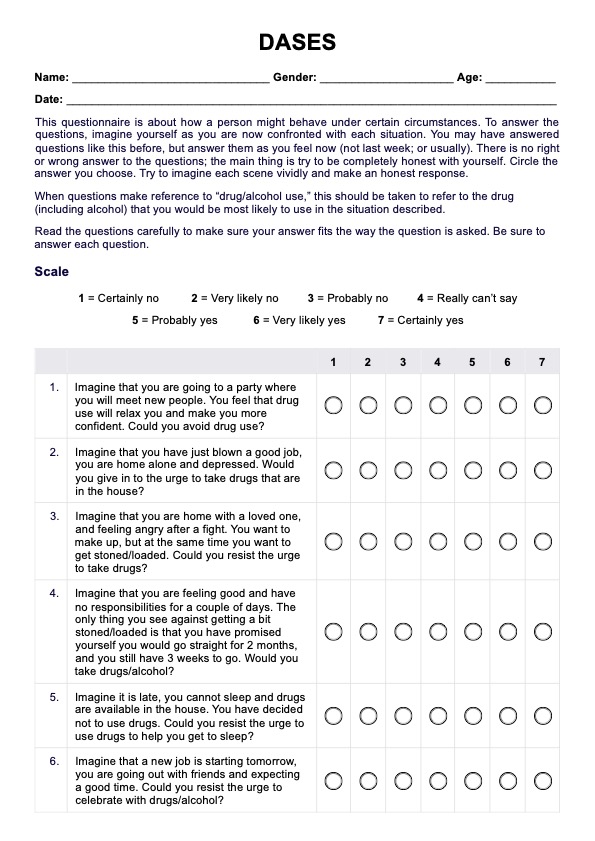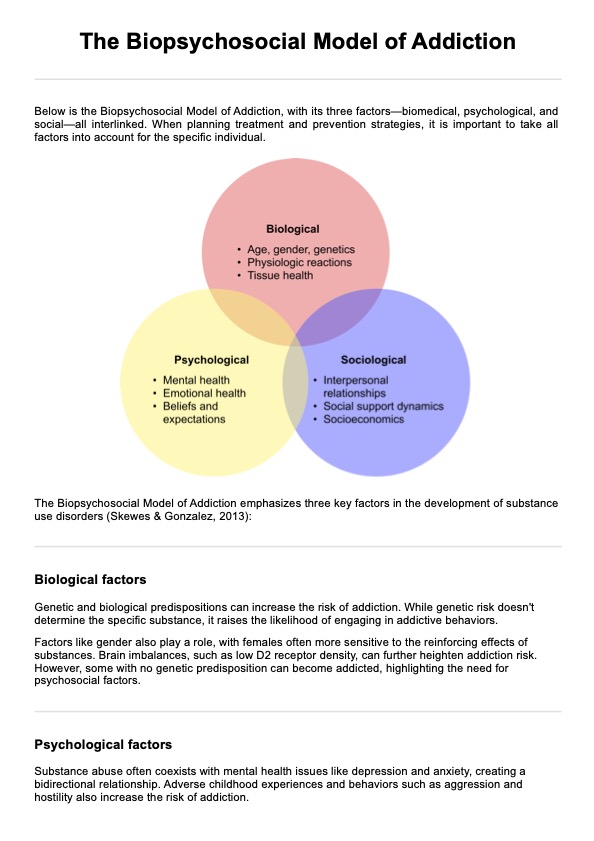Bipolar Disorder Nursing Care Plan
A Bipolar Disorder Nursing Care Plan Template is a document to guide healthcare professionals in caring for individuals diagnosed with bipolar disorder.


What is a Bipolar Disorder Nursing Care Plan Template?
A Bipolar Nursing Care Plan Template is a comprehensive document utilized by healthcare professionals to guide and structure the care provided to individuals diagnosed with bipolar disorder. This template serves as a foundational tool, streamlining the assessment process by delving into the patient's psychiatric history, mood states, and potential risk factors, including suicidal ideation.
It aids in identifying specific nursing diagnoses tailored to the patient's unique condition, such as addressing the risk of injury during manic episodes or potential self-esteem disturbances during depressive phases.
The template establishes clear and measurable goals for care, targeting mood stabilization, relapse prevention, and overall functional improvement. Through the delineation of nursing interventions, collaboration with the broader healthcare team, and provision of psychoeducation on medication management, the template ensures a holistic approach to address the alternating episodes of mania and depression.
Regular monitoring and periodic reassessment, as outlined in the template, enable healthcare providers to adapt the care plan to the evolving needs of the patient, ultimately fostering consistent, individualized care for those grappling with bipolar disorder.
Bipolar Disorder Nursing Care Plan Template
Bipolar Disorder Nursing Care Plan Example
How does it work?
When filling out a Printable Bipolar Disorder Nursing Care Plan Template the main steps include:
- Assessment: Conduct a comprehensive assessment of the patient's psychiatric history, current mood state, triggers, and medication history. Evaluate potential risk factors, including suicidal ideation or self-harm.
- Nursing diagnoses: Identify nursing diagnoses based on assessment findings, such as "Risk for injury related to impulsive behavior during manic episodes" or "Risk for self-esteem disturbance related to depressive episodes."
- Goals: Establish clear, measurable goals for the patient's care, addressing mood stabilization, preventing relapses, and improving overall functioning.
- Interventions: Develop specific nursing interventions to address the patient's needs during manic and depressive phases. Collaborate with the healthcare team, including psychiatrists, therapists, and support staff, to ensure a multidisciplinary approach to care. Provide education on medication management and potential side effects.
- Evaluation criteria: Define criteria for evaluating the effectiveness of interventions, including improvements in mood stability, adherence to treatment plans, and enhanced coping skills.
- Crisis intervention plan: Develop a crisis intervention plan for managing acute episodes, including clear steps for addressing potential suicidal ideation or other emergencies.
- Psychoeducation: Offer psychoeducation to the patient and their support system, promoting understanding of bipolar disorder, recognizing early signs of mood changes, and encouraging adherence to treatment.
- Regular monitoring: Monitor mood fluctuations, medication side effects, and overall treatment progress regularly. Periodically reassess and modify the care plan based on the patient's evolving needs.
When would you use this Template?
Bipolar disorder nursing care plan templates are valuable tools for nurses who care for patients with bipolar disorder. They can be used in a variety of settings, including:
- Inpatient care: When admitting a patient with bipolar disorder to a hospital or other inpatient facility, a template can help nurses quickly and effectively assess the patient's needs and develop a plan of care.
- Outpatient care: Nurses who provide ongoing care to patients with bipolar disorder once they have been discharged can use a template to track the patient's progress, monitor medication adherence, and identify potential problems early on. This can hopefully aid the patient from being readmitted.
- Emergent care: A template can be used to assess and manage patients with bipolar disorder who are experiencing an acute manic or depressive episode. It will be available to show current and previous medications, treatments, and episodes.
- Consultation: Nurses who consult with other healthcare providers about patients with bipolar disorder can use a template to provide a comprehensive overview of the patient's condition and treatment plan.
- Education and training: Templates can be used to educate other nurses about bipolar disorder and how to provide effective care to patients with this condition.
For a comprehensive set of tools, explore our nursing care plan template and care plan template, designed to manage client issues through diverse approaches.
What do the results mean?
When using a Free Bipolar Disorder Nursing Care Plan Template common results include:
Symptom management: A well-implemented Bipolar Disorder Nursing Care Plan Template manifests in positive outcomes for symptom management. Notable achievements include a reduction in the severity and frequency of both manic and depressive episodes. This improvement is further underscored by enhanced mood stability and emotional regulation, contributing to a decreased risk of suicidal ideation or attempts. Additionally, the template demonstrates effectiveness in improving sleep patterns and energy levels, crucial factors in the overall well-being of individuals with bipolar disorder.
Psychosocial functioning: The positive impact of a thoughtfully crafted care plan extends to psychosocial functioning. Successful outcomes are reflected in improved social interactions and relationships. Individuals following the care plan exhibit increased participation in work, school, or other activities, illustrating a holistic approach to managing bipolar disorder. Furthermore, the plan contributes to reduced stress and anxiety, fostering enhanced self-esteem, confidence, and a greater sense of control over one's life.
Overall well-being: The ultimate goal of the Bipolar Disorder Nursing Care Plan Template is the overall well-being of the patient. Positive results are evident in an increased quality of life, marked improvements in both physical and mental health, and greater satisfaction with life. The implementation of the care plan is associated with a reduced reliance on emergency care and hospitalizations, emphasizing the template's role in enhancing the individual's ability to cope effectively with life's challenges. These outcomes collectively signify the efficacy and success of a tailored care plan in promoting the comprehensive well-being of individuals managing bipolar disorder.
Research & evidence
One qualitative study sheds light on the daily practice activities of community psychiatric nurses (CPNs) dedicated to the care of outpatients with bipolar disorders in the Netherlands. Through semistructured interviews with 23 CPNs and additional focus group sessions, the study delves into the challenges faced by patients with bipolar disorder, their desired outcomes, the interventions employed, and the role of CPNs in outpatient treatment. A prominent finding underscores the absence of a systematic approach to the nursing process, revealing a critical gap in the care provided to individuals with bipolar disorder.
This emphasizes the importance of Bipolar Disorder Nursing Care Plans as integral tools in addressing this gap. A well-structured care plan, as recommended in the conclusion, is essential to provide a systematic and individualized approach, ensuring that patients receive comprehensive and tailored care, ultimately enhancing their overall well-being and treatment outcomes. The study's recommendations for improvement align with the significance of nursing care plans in establishing a systematic framework for addressing the complexities associated with bipolar disorder management (Goossens et al., 2008).
A systematic review by Crowe et al (2010), emphasizes the crucial role of nursing care plan templates in addressing the challenges of bipolar disorder. Despite the efficacy of medication, achieving functional recovery remains a significant obstacle. Psychosocial interventions, aligned with the structured nature of nursing care plans, prove effective when used in conjunction with medication. These interventions, incorporating psycho-education elements, highlight the importance of acceptance, awareness of prodromes, and effective communication. The review underscores the significance of mental health nurses in integrating these templates into practice, leveraging their expertise to lead trials and enhance overall patient outcomes in managing bipolar disorder. Nursing care plan templates emerge as essential tools in providing systematic and individualized care for individuals with bipolar disorder (Crowe et al., 2010).
References
Crowe, M., Whitehead, L., Wilson, L., Carlyle, D., O’Brien, A., Inder, M., & Joyce, P. (2010). Disorder-specific psychosocial interventions for bipolar disorder—A systematic review of the evidence for mental health nursing practice. International Journal of Nursing Studies, 47(7), 896–908. https://doi.org/10.1016/j.ijnurstu.2010.02.012
Goossens, P. J. J., Beentjes, T. A. A., de Leeuw, J. A. M., Knoppert-van der Klein, E. A. M., & van Achterberg, T. (2008). The Nursing of Outpatients with a Bipolar Disorder: What Nurses Actually Do. Archives of Psychiatric Nursing, 22(1), 3–11. https://doi.org/10.1016/j.apnu.2007.05.004
Martin, P. (2016, October 13). 6 Bipolar Disorders Nursing Care Plans. Nurseslabs. https://nurseslabs.com/bipolar-disorders-nursing-care-plans/
rnpedia. (2014, December 30). Bipolar Disorder. RNpedia. https://www.rnpedia.com/nursing-notes/psychiatric-nursing-notes/bipolar-disorder/
Commonly asked questions
Thorough assessment, accurate diagnosis, and a personalized intervention plan. However, Carepatron offers a ready-to-use downloadable Bipolar Disorder Nursing Care Plan template.
Admitting new patients, managing symptom flare-ups, providing ongoing care, and educating other providers.
Enhancing communication, promoting individualized care, and optimizing patient outcomes.
Experienced psychiatric nurses, mental health professionals, and healthcare institutions such as Carepatron.


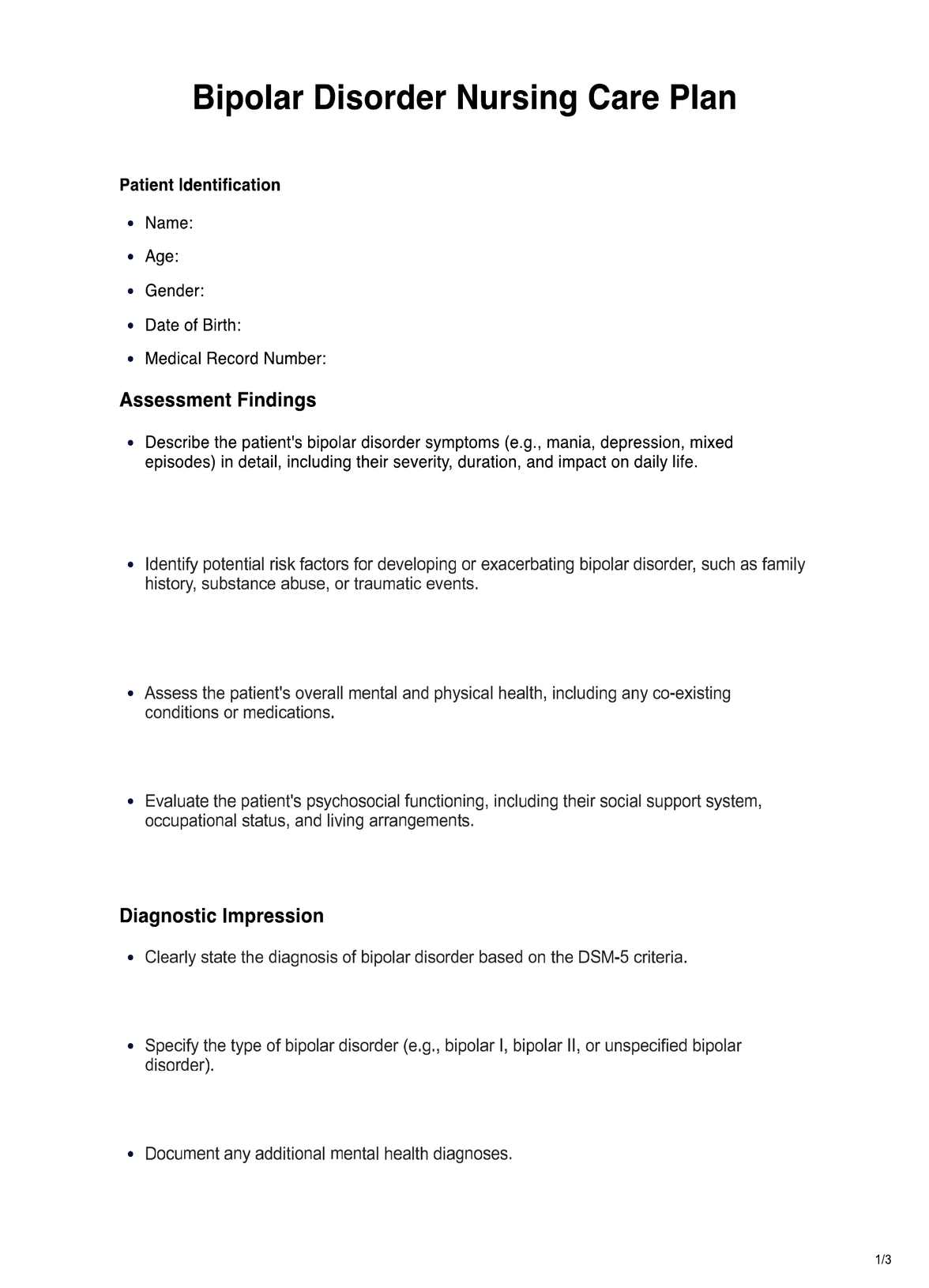
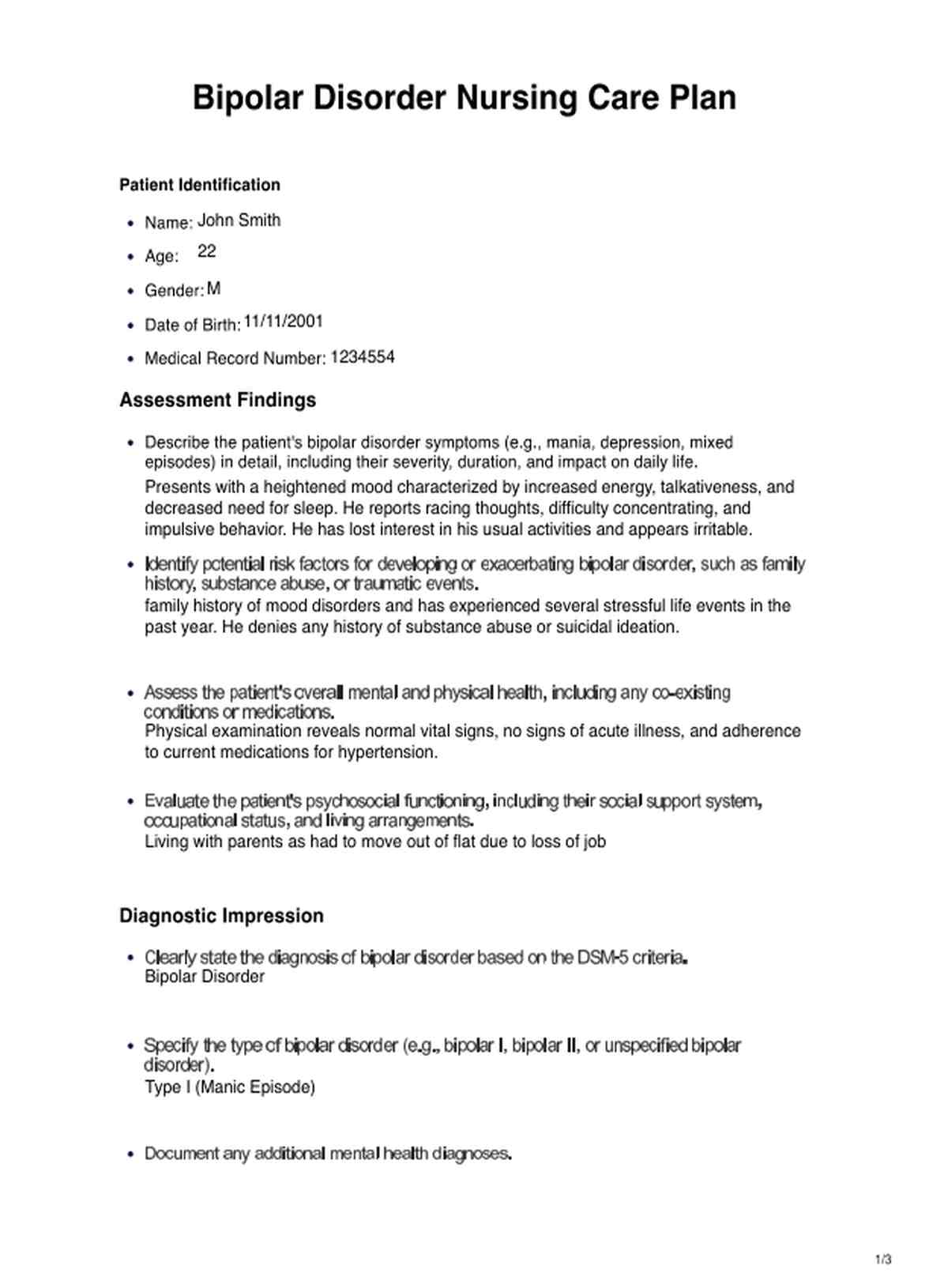



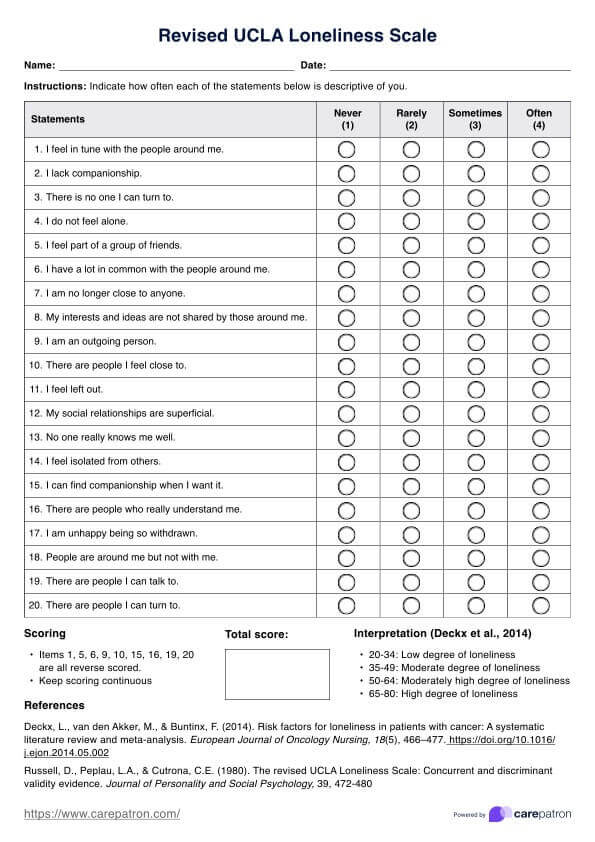












-template.jpg)


